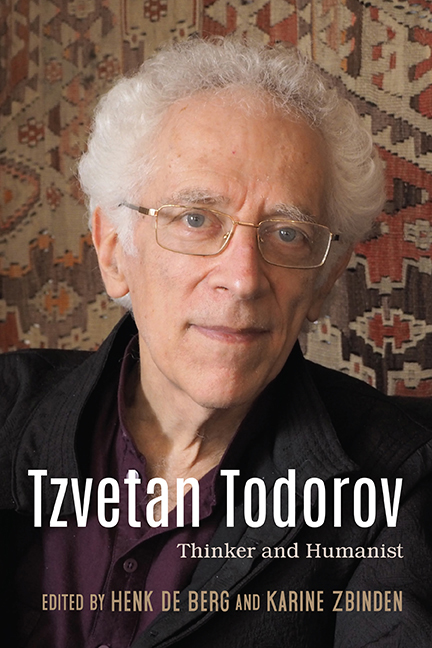Book contents
- Frontmatter
- Contents
- Acknowledgments
- Introduction
- 1 A Marginal Centrist: Tzvetan Todorov and the French Intellectual Field
- 2 Todorov and Camus
- 3 The Enlightenment Redux: Autonomy in Todorov, Glucksmann, and Onfray
- 4 Todorov's Reading of Rousseau: A Heritage for Our Times?
- 5 Tzvetan Todorov's Enlightenment
- 6 Todorov and Bakhtin
- 7 Tzvetan Todorov and the Writing of History
- 8 Tzvetan Todorov and the Trials of History: A Dissenting Voice
- 9 European Integration and the Cultural Cold War: Todorov and Denis de Rougemont
- 10 Tzvetan Todorov on Totalitarianism, Scientism, and Utopia
- 11 Tzvetan Todorov's Political Philosophy
- 12 Interview with Tzvetan Todorov
- Notes on the Contributors
- Index
4 - Todorov's Reading of Rousseau: A Heritage for Our Times?
Published online by Cambridge University Press: 26 April 2020
- Frontmatter
- Contents
- Acknowledgments
- Introduction
- 1 A Marginal Centrist: Tzvetan Todorov and the French Intellectual Field
- 2 Todorov and Camus
- 3 The Enlightenment Redux: Autonomy in Todorov, Glucksmann, and Onfray
- 4 Todorov's Reading of Rousseau: A Heritage for Our Times?
- 5 Tzvetan Todorov's Enlightenment
- 6 Todorov and Bakhtin
- 7 Tzvetan Todorov and the Writing of History
- 8 Tzvetan Todorov and the Trials of History: A Dissenting Voice
- 9 European Integration and the Cultural Cold War: Todorov and Denis de Rougemont
- 10 Tzvetan Todorov on Totalitarianism, Scientism, and Utopia
- 11 Tzvetan Todorov's Political Philosophy
- 12 Interview with Tzvetan Todorov
- Notes on the Contributors
- Index
Summary
IN MARCH 2006, Tzvetan Todorov organized an exhibition at the Bibliotheque Nationale de France entitled Lumieres! Un heritage pour demain (Enlightenment: A Heritage for Tomorrow). At the entrance to the exhibition site, images of Wolfgang Amadeus Mozart and Jean- Jacques Rousseau, two figures that he saw as representative of eighteenthcentury Enlightenment, were chosen to welcome the visitors. In this chapter, I shall attempt to explain what Todorov means when he speaks about the heritage of the Enlightenment for tomorrow's world: what, according to Todorov, can we still learn from the Enlightenment? My focus will be on Rousseau, and I shall seek to answer the question why Todorov, a rational and moderate thinker who places himself firmly in the humanist tradition (a tradition characterized, according to him, by an adherence to the ideals of human autonomy and universal values), sees Rousseau as “the greatest French-language thinker of the Age of Enlightenment” and indeed as “the greatest French thinker” of all time. More specifically, I shall explore which characteristics of Rousseau's philosophical thought are understood by Todorov as being both emblematic of the Enlightenment and still meaningful today.
Praising the Enlightenment at the Turn of the Twenty-First Century
Let us start with In Defence of the Enlightenment, the text Todorov wrote to accompany the exhibition mentioned above. In the early 1980s, Todorov's academic interests had started to move away from structuralism and literary theory toward history and political theory, a shift some commentators have called his “ethical turn.” As John T. Scott and Robert Zaretsky have pointed out, however, Todorov carried over his earlier search for a firm—objective or intersubjective—theoretical footing (the kind of footing he previously sought in a “science of literature”) into his new historical and political interests.4 In line with this, In Defence of the Enlightenment seeks to formulate—at the beginning of the twenty-first century, “after the death of God and the collapse of utopias”—an “intellectual and moral base” on which we can “build our communal life.” This base, Todorov argues, should be a critical humanism inspired by the Enlightenment.
- Type
- Chapter
- Information
- Tzvetan TodorovThinker and Humanist, pp. 74 - 91Publisher: Boydell & BrewerPrint publication year: 2020



